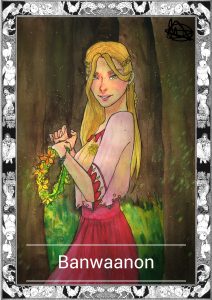Banwaanon, meaning ‘of the forest’, are sometimes called Katsila from ‘Castilian’ (shortened to kastila) meaning Spaniard. They are said to have Caucasian features and coloring. The legend is rumored to have started in Northern Samar where, in 1614, the Jesuits established a mission. These missionaries stayed until the late 17th century when they were expelled from the Philippines and were replaced by the Franciscans. It is unclear whether the Banwaanon features were adopted after the arrival of the missionaries, but their legend was certainly adopted to fit the angel motif of Catholicism as it made its way throughout the Visayas. The Banwaanon only appear to a chosen few and help only those who first show favor.
Having to do with demonology and angelology is the belief common to all nationalities that supernatural beings, as delineated in folklores, are either beneficent or malevolent. Even the denizens of fairy-land, who are understood to be mostly helpful, are thus classified. So are the Banwaanon of the Cebuano-Visayan Filipinos. – Damiana Eugenio “Denizens of Fairyland”, Philippine Folk Literature: The Legends

A Banwaanon Tale
“I’m not tired yet!”
“Shhh, it’s bedtime already and you need your rest.”
“But I’m not tired! Mama, can you tell me a story? Pleeeeassse…..”
“All right, all right, but just one and you go right to bed after okay?”
“Yes, I promise! Now what story are you going to tell me? Can it have dragons and turtles and spacemen?!”
“You have such an active imagination, but I’m going to tell you a story that my mother used to tell me.”
“OOOOoooohhhh.”
“Hush now, let’s start the story. It’s called Juana and the Banwaanon.
Once upon a time there was a girl named Juana, she was not the prettiest girl in the town, and she always tried to forget the fact. Unfortunately, the people around her would not let her forget. Most of their jokes would be good natured, though, but one girl, Luisa, was nothing but cruel.
One day, Juana was ironing one of Luisa’s gowns and accidentally burned it. Luisa was furious, she slapped Juana right across the face and even told her to go drown herself in the sea. Juana, who wasn’t about to take advice from someone that just beat her, left the house and went back to her parent’s home in the province.
Before she reached her destination, she decided to stop by a spring near a cave to have a drink of cool water. As she looked up, she was surprised to see a beautiful, fair haired woman carrying some plates. ‘These dishes are all very dirty,’ the woman said ‘would you be so kind as to break them and throw them in the river for me?’
Juana did the favor for the woman and brought the plates by the river, but then she thought how wasteful it would be to just destroy the lovely porcelain and decided to wash them and return them to the woman instead.
The woman thanked her and said ‘For your wisdom you will be rewarded, you shall be ugly no more. Show yourself to the townspeople.’
When Juana went back to own she had to identify herself to the townspeople because of how different she looked. Luisa, who was suddenly nice to her, desperately asked her how this happened. Juana related her experience with the woman who had told her to break the porcelain plates.
Luisa went to the stream by the cave, met the woman and was told the same thing about the plates. In her hurry, she obeyed the woman to the letter, breaking the plates in the river. ‘Thank you, you may go now’ was the only thing the woman said to Luisa after.
Luisa went back to the town, not knowing she had been transformed into something uglier than Juana had ever been.”
“That seems like a very strange story mommy. What does it mean?”
“It’s less of a story and more of a warning, sweetie. When you deal with the Banwaanon, you never know what you’re going to get, but as long as you show wisdom and think about things, you may manage to come out better than before.
Now it’s bedtime, let me tuck you in.”
Story adapted from ‘Denizens of Fairyland’ in Philippine Folk Literature: The Legends. Eugenio. 2002.
For more stories follow The Spirits of the Philippine Archipelago
ALSO READ: The DIWATA of Philippine Mythology | Forest Spirits & Goddesses
Speculative fiction writer. Philippine folklore and heritage researcher.
Author of The Spirits of the Philippine Archipelago.
Currently in the middle of fixing up an encyclopedia of Philippine Mythical creatures.


